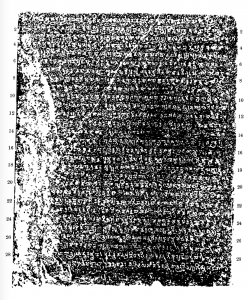
This stone inscription, inscribed on the side wall of the outside veranda of cave 17, is much damaged by exposure, which according to Shastri (1997: 46), has lead the correct decipherment of the inscription to be very problematic. The inscription starts with a dedication to the Buddha, unusual as many of the Vākāṭaka period inscriptions and charters are dedicated to Hindu gods. The inscription was carved to record the creation of Buddhist stupas and institutions by a ruler called Dharādhipa and with the wish for the longevity of these structures. The inscription was carved under the name of Ravisāmba, a vassal of the Vākāṭaka king Hariṣeṇa. The inscription also includes a genealogy for Dharādhipa and Ravisāmba.
| Metadata | |
|---|---|
| Inscription ID | IN00180 |
| Title | Ajanta Cave 17 Inscription of Ravisamba |
| Alternative titles | Ajanta Cave XVII Inscription of the Time of Harishena |
| Parent Object | OB00167 |
| Related Inscriptions | |
| Responsibility | |
| Author | Dániel Balogh |
| Print edition recorded by | Dániel Balogh |
| Source encoded | |
| Digitally edited by | |
| Edition improved by | Dániel Balogh |
| Authority for | Own research. |
| Metadata recorded by | Dániel Balogh |
| Authority for metadata | |
| Metadata improved by | |
| Authoriy for improved | |
| Language | संस्कृतम् |
| Reigning monarch | Hariṣeṇa |
| Commissioner | Ravisāmba |
| Topic | creation of Buddhist stupas and institutions by a ruler called Dharādhipa |
| Date: | |
| Min | 460 |
| Max | 510 |
| Comment | Basis of dating: approximate reign of Hariṣeṇa. |
| Hand | |
| Letter size | 2.2 |
| Description | southern class, Central Indian, no prominent boxheads |
| Layout | |
| Campus: | |
| Width | 122 |
| Height | 135 |
| Description | 29 lines of text, badly damaged by weather. Character size estimated. |
| Decoration | None. |
| Bibliography | |
| References | First (probably) reported in passing in Prinsep 1836: 556-561, with partial eye copy (Plate 27 No. 10). First edited (with eye copy, transcript and translation) in Bhau Daji 1863a: 59-61. Re-edited by Bhagwanlal Indraji in Burgess Indraji 1881: 73-76; by Bühler in Burgess 1883: 128-132 with a facsimile (Plate 56) made by Indraji and "considerably worked up by hand" (according to Mirashi 1963: 120); by Mirashi with a new rubbing in Mirashi 1949 and Mirashi 1963. Discussed in Shastri 1997: 46-49. |
| Add to bibliography | |
| Misc notes | |